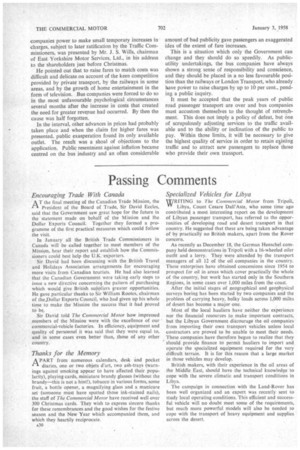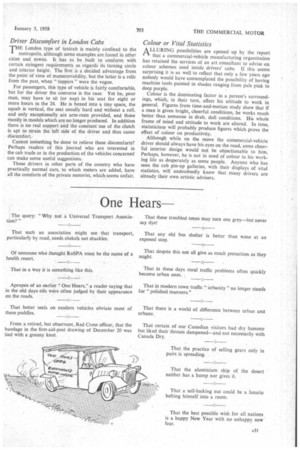Passing Comments
Page 32

Page 33

If you've noticed an error in this article please click here to report it so we can fix it.
Encouraging Trade With Canada
AT the final meeting of the Canadian Trade Mission, the President of the Board of Trade, Sir David Eccles, said that the Government saw great hope for the future in the statement made on behalf of the Mission and the Dollar Exports Council_ Together they formed a programme of the first practical measures which could follow the visit.
In January all the British Trade Commissioners in Canada will be called together to meet members of the Mission, hear their report and establish how the Commissioners could best help the I.J.K.--exporters.
Sir David had been discussing with the British Travel and Holidays Association arrangements for encouraging more visits from Canadian tourists. He had also learned that the Canadian Government were taking early steps to issue a new directive concerning the pattern of purchasing which would give British suPpliers greater opportunities. He gave particular thanks to Sir William Rootes, chairman of the_Dollar Exports Council, who had given up his whole time to make the Mission the success that it had proved to be.
Sir David told The Commercial Motor how impressed members of the Mission were with the excellence of our commercial-vehicle factories. In efficiency, equipment and quality of personnel it was said that they were equal to, and in some cases even better than, those of any other country.
Thanks for the Memory
A PART from numerous calendars, desk and pocket I—I diaries, one or two objets d'art, two ash-trays (warnings against smoking appear to have affected their popularity), playing cards, miniature brandy glasses (without the brandy—this is not a hint!), tobacco in various forms, some fruit, a bottle opener, a magnifying glass and a manicure set (someone must have spotted those ink-stained nails), the staff of The Commercial Motor have received well over 300 Christmas cards. They wish to express sincere thanks for these remembrances and the good wishes for the festive season and the New Year which accompanied them, and which they heartily reciprocate.
A30
Specialized Vehicles for Libya
WRITING to The Commercial Motor from Tripoli,
Libya, Count Cesare Dall'Aste, who some time ago contributed a most interesting report on the development of Libyan passenger transport, has referred to the opportunities of developing road and desert transport in that country. He suggested that these are being taken advantage of by practically no British makers, apart from the Rover concern.
As recently as December 18, the German Henschel company held demonstrations in Tripoli with a 16-wheeled oiler outfit and a lorry. They were attended by the transport managers of all 12 of the oil companies in the country. These enterprises have obtained concessions since 1954 to prospect for oil in areas which cover practically the whole of the country, but work has started only in the Southern Regions, in some cases over 1,000 miles from the coast. After the initial stages of geographical and geophysical surveys boring has been started by two companies and the problem of carrying heavy, bulky loads across 1,000 miles of desert has become a major one.
Most of the local hauliers have neither the experience nor the financial resources to make important contracts, but the Libyan Government discourage the oil companies from importing their own transport vehicles unless local contractors are proved to be unable to meet their needs. These companies have therefore begun to realize that they should provide finance to permit hauliers to import and operate the specialized equipment required for the very difficult terrain. It is for this reason that a large market in those vehicles may develop.
British makers, with their experience in the oil areas of the Middle East, should have the technical knowledge to cope with the severe climatic and transport conditions in Libya.
The campaign in connection with the Land-Rover has been well organized and an expert was recently sent to study local operating conditions. This efficient and successful vehicle will no doubt meet some of the requirements, but much more powerful models will also be needed to cope with the transport of heavy equipment and supplies across the desert.
Driver Discomfort in London Cabs
THE London type of taxicab is mainly confined to the metropolis, although some examples are found in other cities and towns. It has to be built to conform with certain stringent requirements as regards its turning circle and interior height. The first is a decided advantage from the point of view of manceuvrability, but the latter is a relic from the past, when " toppers " were the vogue.
For passengers, this type of vehicle is fairly comfortable, but for the driver the converse is the case. Yet he, poor man, may have to sit (or nap) in his seat for eight or more hours in the 24. He is boxed into a tiny space, the squab is vertical, the seat usually hard and without a roll, and only exceptionally are arm-rests provided, and those mostly in models which are no longer produced. In addition there is no real support and the constant use of the clutch is apt to strain the left side of the driver and thus cause discomfort..
Cannot something be done to relieve these discomforts? Perhaps readers of this journal who are interested in the cab trade or in the production of the vehicles concerned can make some useful suggestions.
Those drivers in other parts of the country who have practically normal cars, to which meters are added, have all the comforts of the private motorist, which seems unfair.
Colour or Vital Statistics
tX LLURING possibilities are opened up by the report 1-1 that a commercial-vehicle manufacturing organization has retained the services of an art consultant to advise on colour schemes used inside drivers' cabs. If this seems surprising it is as well to reflect that only a few years ago nobody would have contemplated the possibility of having machine tools painted in shades ranging from pale pink to deep purple.
Colour is the dominating factor in a person's surroundings, which, in their turn, affect his attitude to work in general. Figures from time-and-motion study show that if a man is given bright, cheerful conditions, he works much better than someone in drab, dull conditions. His whole frame of mind and attitude to work are altered. In time, statisticians will probably produce figures which prove the effect of colour on productivity.
Although while on the move the commercial-vehicle driver should always have his eyes on the road, some cheerful interior design would not be objectionable to him. Perhaps, however, he is not in need of colour in his working life as desperately as some people_ Anyone who has seen the cab pin-up galleries, with their displays of vital statistics, will undoubtedly know that many drivers are already their own artistic advisers.




































































































